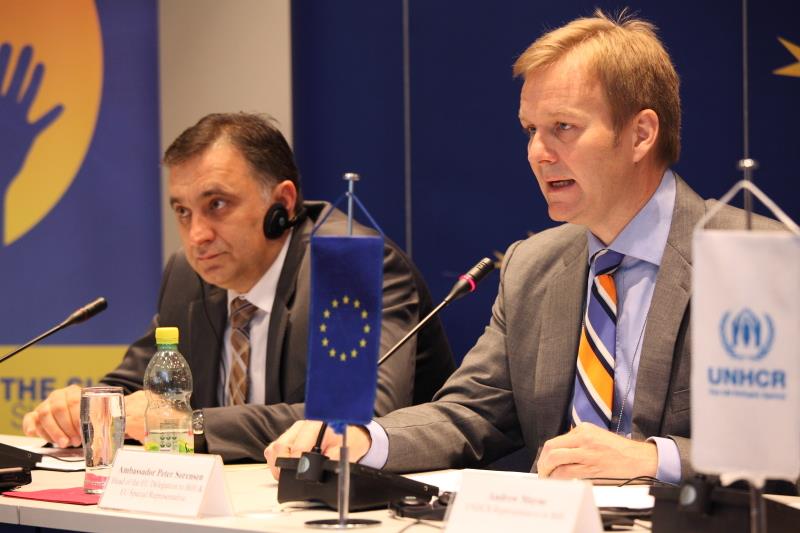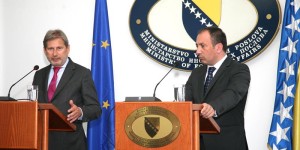28 April 2014, EU Delegation to BiH, Sarajevo
Dear Ministers, Excellencies, Ladies and Gentlemen, Colleagues,
Thank you for coming today for marking the beginning of yet another EU project targeting implementation of Annex VII Strategy. I am glad we are meeting on such an important subject.
Ensuring a better future for refugees and internally displaced persons (IDP) in Bosnia and Herzegovina has been and is a major priority for the EU.
Since 1996, EU funds – around 500 Mio EUR – have been used to rehabilitate properties, basic utilities and social infrastructure as well as livelihood measures and creation of employment. Some 30 000 properties were rebuilt and around 4500 jobs were created.
National IPA 2012 project for the Annex VII Strategy is jointly managed with UNHCR, in the amount of 7 million EUR (and another 7 million EUR is allocated under the upcoming national IPA 2013 programme).
The Annex VII project started in January 2014. It shall assist approximately 125 vulnerable returnee or IDP families with the housing measures, in prioritized communities in targeted municipalities. An additional 480 families will receive sustainability measures in different areas of employment, self-employment, training, and others. In addition, at least 500 persons will be provided with effective access to rights and access to social welfare entitlements.
The project will be implemented over 36 months by the UNHCR in cooperation with the partner organisations (UNDP, UNICEF, International Organization for Migration, Bosnian Humanitarian Logistics Service, Foundation of Local Democracy, Hilfswerk Austria International, Association ‘Vaša prava’), and Bosnia and Herzegovina authorities at all levels. The Annex VII project will be shortly presented by Mr Mayne in more detail.
Today I would particularly like to urge Municipal Departments for Reconstruction, Economy and Social Protection, with Social Welfare Centres and relevant Ministries at all levels, to adopt and implement the methodology to be developed by UNHCR and its partners within the Annex VII project.
Vulnerability shall be the guiding principle for the assistance.
By introducing this methodology we seek to respond to the social exclusion issues affecting the most vulnerable IDP and returnee groups in BiH.
In this context, I would like to stress one fundamental factor important to ensuring en efficient implementation of this Annex VII project that we focus on today and that is the need for sustainability measures.
Last year, the international partners signed an important declaration with the Ministers responsible for Refugee Return in Bosnia and Herzegovina, in which emphasis is placed not only on housing but on all necessary complementary measures and coordination of different administrations and services to make return efforts sustainable.
These complementary sustainability measures are necessary for the success of this – as well as other return related – project. What has at all cost to be avoided is that the assistance end up so called “dead zones”, areas with low occupancy of houses and apartments. We need to have authorities of Bosnia and Herzegovina ensure that education, health, social security benefits, employment, access to rights, technical infrastructure and others are tackled as well, so that the beneficiaries can flourish in their new homes. This is what we expect. This is what the IDPs and refugees are entitled to expect as well.
Finally a quick word about the Regional Housing Programme, which we see in conjunction with today’s Annex VII Project. As you know, the EU earmarked around 240 Million EUR in support to the Regional Housing Programme. Bosnia and Herzegovina is to target 5,400 households with the assistance. We will seek to create synergies with today’s Annex VII project, so we very much hope that the authorities in Bosnia and Herzegovina can and will do all within their power to ensure that the Regional Housing Programme is implemented with the speed and efficiency necessary. The refugees and IDPs deserve that.
People who are targeted in these programmes have been away from their homes for more than 20 years now, and it is our common responsibility to finally enable them to receive a long-term housing and “life” solution.
Thank you very much for your attention and thank you for coming.
CHECK AGAINST DELIVERY




